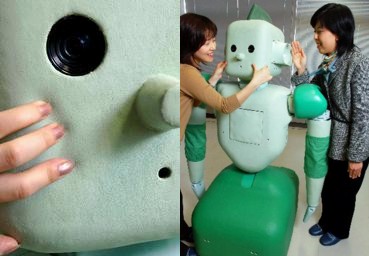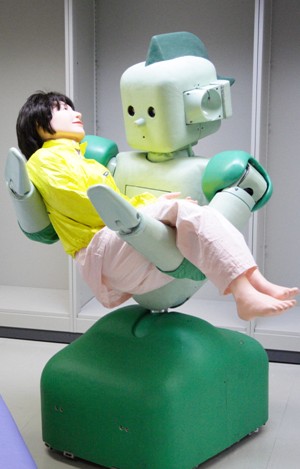RI-MAN the soft-skinned robot

RI-MAN is the world’s first robot designed for lifting and carrying humans. A variety of sensors, including flexible tactile sensor sheets, provide RI-MAN with a sense of vision, hearing, touch, and smell. These senses help RI-MAN perform tasks such as locating people who are calling out to it, responding to spoken commands, carefully lifting those who need lifting, and checking the sanitary condition of the person it is carrying. RI-MAN is able to integrate a wide range of sensory data to adapt to changes in the environment.
The robot is also equipped with 19 motors, controlled by a system of hierarchical distributed processing that is modeled after the nervous system found in biological organisms. This “nervous system” — a network of what RIKEN calls C-CHIPs — integrates sensor data processing with motor control to provide RI-MAN the autonomy needed to respond quickly to changes in the environment. The head has 3 degrees of freedom, each arm has 6, the waist has 2, and the base (which acts as RI-MAN’s legs) has 2. Safety-related technology, including safety circuits and soft skin and joints designed to prevent injury, are incorporated into RI-MAN’s design.
Still in the initial testing phase, RI-MAN is currently practicing with dolls that weigh about 12 kg (26 lbs). Researchers plan to increase the weight of the practice dolls over time, with the aim of achieving the ability to lift human adults in 5 years. Researchers will continue working to upgrade RI-MAN’s sensors and data processing skills to improve adaptability. The aim is to create a robot with the physical power needed for heavy lifting and the reasoning skills needed for operating in places like people’s homes. RIKEN says that with these skills, RI-MAN can be put to work in nursing and rehabilitation, in furniture moving, or in any other job that requires muscle.
RI-MAN, an autonomous lifestyle-support robot developed at RIKEN’s Bio-Mimetic Control Research Center (Nagoya, Japan), now has soft skin. If put to work in care facilities, RI-MAN’s soft arms and chest will enable it to perform delicate work that present-day robots are not allowed to do, such as lifting patients up into its arms.
The robot, which is 158 cm (5 ft 2 in) tall and weighs about 100 kg (220 lbs), consists of a humanoid upper body that sits atop a wheeled base. A 5-mm layer of silicone covers most of the upper body, including the face and chest. The skin sinks in slightly when pressed, giving it a resilient, supple feeling. Under the layer of silicone are 320 pressure sensors that enable RI-MAN to self-adjust the softness as needed.
Research team leader Zhiwei Luo says, “We may see commercial applications of this technology in as early as five years.”








 My StumbleUpon Page
My StumbleUpon Page




No comments:
Post a Comment